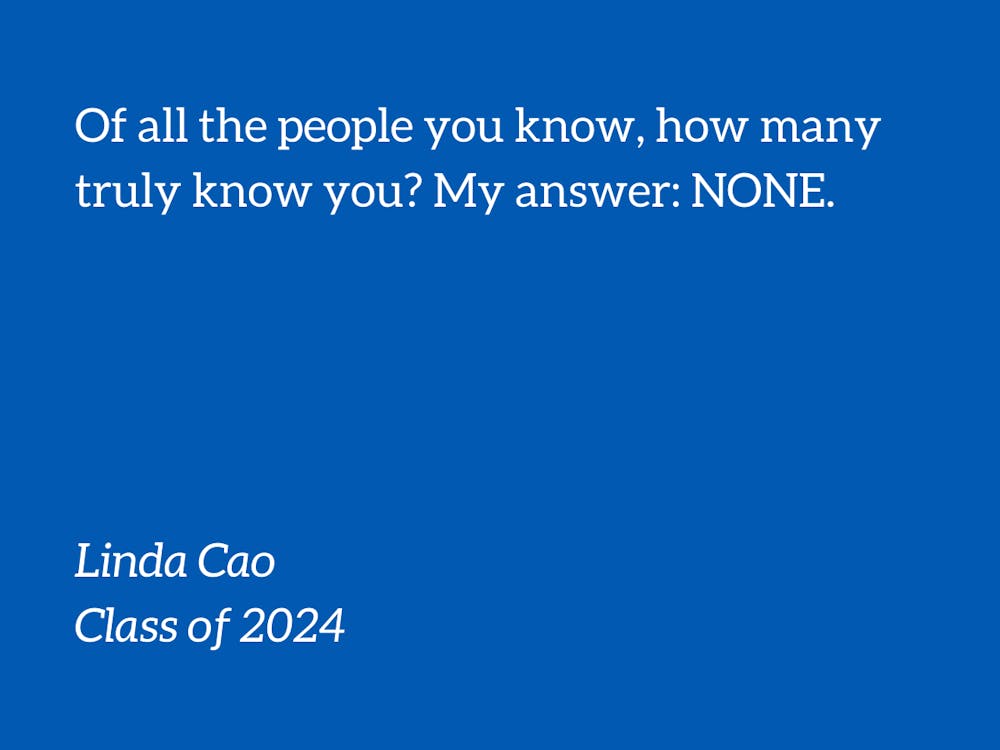How many people do you know?
Your answer might be a scroll through your Instagram and Twitter followers or a handful of your most recent contacts. Perhaps you’ll pull out a selfie of your best friend and ramble about how they’re never on time. Whatever your answer is, the fact is, you know someone.
Now, of all the people you know, how many truly know you?
My answer: NONE.
Although your immediate response may be the complete opposite, I know, ironically, that at some point in your life, you would have given “none” as your answer. The dreadful, heart-wrenching feeling that no one truly understands you, the loneliness that suddenly guts your soul at 3 AM, is conflicting. On one hand, you know that you’re not lonely because you know people (in fact, you literally just got back from a party). And yet, you still feel so unknown.
Especially in unprecedented times like these, it’s as if the physical distance between us has exacerbated the emotional distance. Now, I feel uncomfortable introducing myself to strangers on Zoom, let alone sitting in a circle in class and sharing my insecurities regarding my very bleak future. A future in which, when returning to my empty apartment, I am only greeted with the sound of my keys dropping onto the counter, with no one to turn to for comfort. How can I be optimistic about my future when my supposedly prime years are so depressing?
Furthermore, how do we open up to the world when the world closed itself on us for so long? Fortunately, we’re not alone in feeling lonely. According to a study conducted by “Medical News Today,” approximately 65% of participants reported an increase in loneliness since the beginning of the pandemic. Physical separation is one considerable factor of loneliness, with implemented social distancing and restrictive social gatherings. However, feeling lonely is less about being alone and more about feeling unseen.
Like any good old existential crisis, loneliness creeps up on you. Before you know it, you’re feeling … sad. And being sad is bad. I feel bad when I’m sad. Even more when everyone is so glad, and I’m the only lonely sad lad (yes, rhyming makes me less sad).
However, the even more worrying aspects about loneliness are the detrimental mental and physical repercussions, oscillating between ceaseless anxiety and depression. When we are lonely for a significant period, we get desperate. People throw themselves into unhealthy, imbalanced relationships, holding on to any thread of slightly meaningful interaction. People begin to prioritize quick, shallow relationships over long-term, sincere connections. People shy away from intimacy and quality emotional reciprocity because they don’t mind if they’re not truly seen by others so long as they’re still seen in the picture. People are so abhorrently terrified of feeling lonely that they would rather be taken advantage of countless times and ignore how disadvantageously dangerous such interactions are on their self-worth and self-esteem. (Me, I am people.)
Unfortunately, it is so easy to spiral into a whirlpool of loneliness. Sprinkle in some imposter syndrome, a stressful demanding environment, and very minimal sleep, and you’ve got the perfect recipe for chronic loneliness in college. College, the supposedly pinnacle of our social interaction and emotional development, has become a very isolating wonderland. In fact, I did my freshman year Fall semester completely remote, and I can count the number of engaging, significant interactions with my peers on one hand. But it is the incapability and lack of control of my situation, a seemingly endless pandemic, that truly makes me feel lonely sometimes.
In response to the drastic rise of loneliness amongst adolescents, psychiatric reports have suggested that people should combat loneliness by reaching out to your buddies more often or try to create a safe space to collectively acknowledge everyone’s loneliness. As lovely as these possible solutions sound, they are not as fulfilling as they seem.
Loneliness is not COVID-19; loneliness is a common cold. Unfortunately, you will inevitably get sick and, likewise, occasionally feel lonely. Of course, just like if you were constantly getting sick, if you find yourself feeling extensively lonely, please seek professional help. But when you are sick or lonely, despite how miserable or weak you may feel, eventually, you won’t be struggling to breathe at night. You’ll feel normal again, almost as if nothing ever happened. Essentially, we need to own our loneliness.
There are times when I feel I am a negligible factor, an NPC, a last pick off the bleachers, a troublesome afterthought. But loneliness is not swept away in a single fancy grand gesture. It is relieved in fleeting, unexpected moments. It is when you’re repeatedly running your coffee order through your head, worried you’ll mess it up, but the barista remembers your drink without hesitation. It is when you’re gripping your backpack hastily trying to find a seat, but your far-too-hyper, frazzled best friend leaps up from the second row, excitedly waving you towards a saved seat. It is when you laugh, carelessly and genuinely, and see the people around you unknowingly smile in response. It is in moments like these where you realize that you are seen, you are known and you are not alone.
I intend to live to a hundred years old, so I’ve always been prepared for nights that are longer than usual. If loneliness is bound to follow twilight, then I will patiently endure the unnerving, dreary 3 AMs, knowing that the first ray of sunshine will pierce through the horizon, and I will bask in its warmth soon again.
Linda Cao is a Trinity sophomore. Her column runs on alternate Thursdays.
Get The Chronicle straight to your inbox
Signup for our weekly newsletter. Cancel at any time.
Linda Cao is a Trinity senior and an opinion managing editor of The Chronicle's 119th volume.

